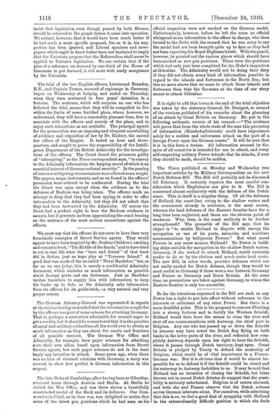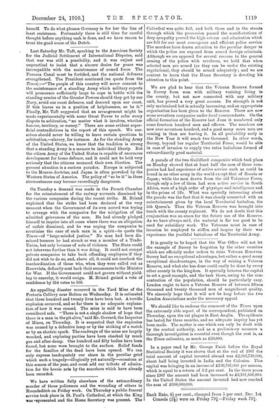So far the intentions expressed in the Bill are such
as any Power has a right to put into effect without reference to the interests or criticisms of any other Power. But there is a more doubtful point. This is the proposal to convert Flushing into a strong fortress and to fortify the Western Scheldt. Holland would then have the means to close the river and shut off sea communications with Antwerp, the chief port in Belgium. Any one who has passed up or down the Scheldt by steamer may have noted the Dutch flag flying on both banks in the lower parts of the river, and reflected how com- pletely Antwerp depends upon her right to have the Scheldt, where it passes through Dutch territory, kept open. Great Britain is pledged by Treaty to defend the neutrality of Belgium, which would be of vital importance in a Franco- German war. But it is obvious that it would be almost im- possible for us to defend it if the Scheldt could be closed and the waterway to Antwerp forbidden to us. It may be said that Holland has no intention of closing the Scheldt, but hints thrown out in recent Dutch debates do suggest that the possi- bility is seriously entertained. Belgium is of course alarmed, and both she and France observe that the Dutch scheme serves German interests alone. For ourselves, while admitting that this is so, we feel a good deal of sympathy with Holland in the extraordinarily difficult position in which she finds
herself. To do what pleases Germany is for her the line of least resistance. Fortunately there is still time for careful thought before anything rash is done, and we have reason to trust the good sense of the Dutch.







































 Previous page
Previous page